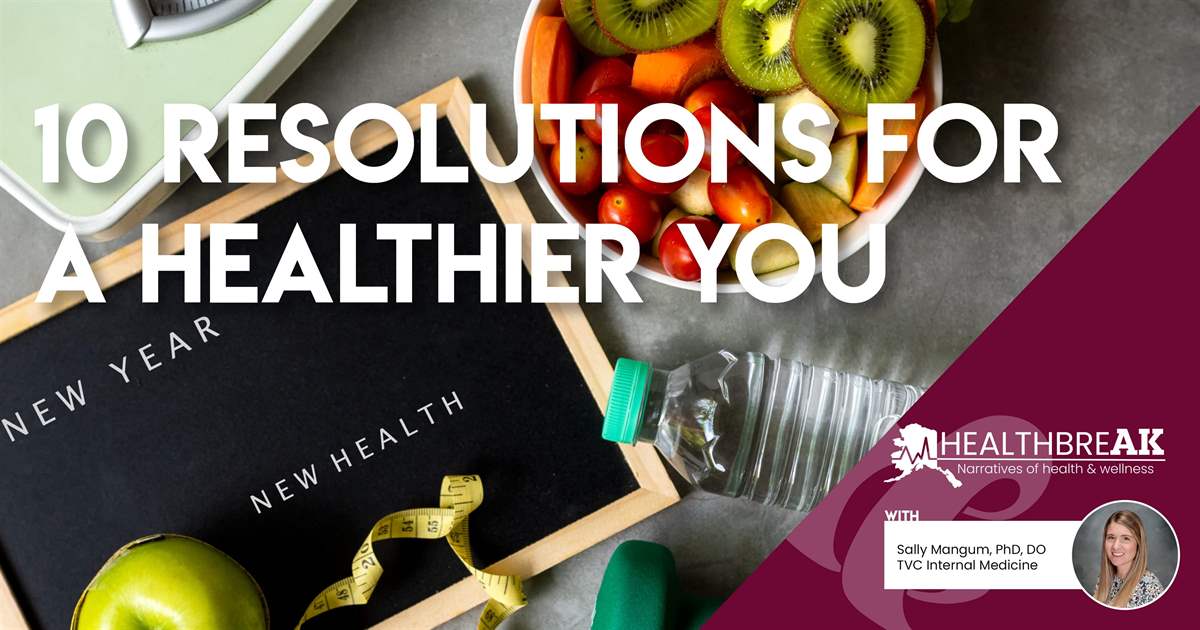 It’s 2021, and if you're like 40% of Americans you've probably made at least one New Year's resolution. When people make resolutions, it's common for them to make ones that address their health, like drinking more water or losing weight.
It’s 2021, and if you're like 40% of Americans you've probably made at least one New Year's resolution. When people make resolutions, it's common for them to make ones that address their health, like drinking more water or losing weight.
Making a healthy New Year's resolution is easy, but sometimes implementing successful change into a long-term routine can be challenging. In fact, research suggests that one-third of people will not continue their New Year's resolutions through the end of January.
Most often, people don’t follow through with their New Year's resolutions because they don’t develop a plan for success. To make sustainable changes towards a healthier you, it's important to set goals that are attainable. In fact, it's best to choose just one or two small changes for the New Year that you can implement gradually in order to improve your overall health.
Here are 10 suggestions to optimize your lifestyle for the new year and a new, healthier you:
 Amy Geiger/Explore Fairbanks
Amy Geiger/Explore Fairbanks- Spend More Time Outside. Spending more time in the great Alaskan outdoors can improve health by relieving stress, elevating mood, and even lowering blood pressure. Taking a walk outside during your lunch break, hiking on weekends, or simply soaking in the beauty of your backyard or local park are all ways to incorporate nature into your daily routine.

- Drink More Water. Your body is about 70% water, and drinking enough of it is vital for optimal health. Rather than setting a goal of 8 glasses a day you can start by gradually replacing other liquids, especially sugary dinks, with water in your diet.

- Try A New Fruit or Vegetable. Bodies need nutrients – like vitamins, minerals, proteins and carbohydrates – to stay healthy. These nutrients mainly come from the food you eat, especially fruits and vegetables. In 2021, consider trying a new fruit or vegetable each month. Here are a few unique options to get you started: kiwi fruit, jicama, kohlrabi, and pomegranates.

- Get More Quality Sleep. Sleep is an essential part of overall health and sleep deprivation can lead to serious consequences. For instance, lack of sleep may increase your risk of weight gain, heart disease, and depression. Avoiding screen time before bed, reducing light pollution in your bedroom, decreasing caffeine intake, and going to bed at a reasonable hour are some simple ways to improve overall sleep quality.

- Step Away From Digital Devices. Being available 24/7 is stressful and can have a negative impact on your health. Staying connected at all times via phones, tablets and other digital devices, can lead to anxiety, distraction, and can decrease productivity. Turning devices off for some time each day can help prioritize relationships and interests you might not otherwise engage in. If this step seems impossible, start small. Each day, turn your phone off for 15 minutes. Once 15 minutes is easy, increase the time you spend away from screens.

- Reduce or eliminate unhealthy habits such as smoking, excessive drinking or illegal drug use. This might not be an easy resolution but something you should consider for a healthier 2021. Start slow, look for local resources, and ask for support. If an unhealthy habit is impacting your life, this might be the most important action you take all year.

- Try one new thing each week. It could be meditation, yoga, a tasty avocado recipe, milling your own grains, a dance class, a new route to work – virtually anything. But no, binging a new Netflix show does not count.

- Schedule a check up with your doctor. A regular wellness check by your health care provider is an important component of overall health. Depending on your age and history, your provider can check cholesterol levels, assess cardiovascular health, review vaccinations, and help make decisions about cancer screenings. Annual physicals are also a great time to talk with your doctor about wellness goals.

- Treat yourself to five minutes a day of “me” time. If you are feeling stressed, anxious and overwhelmed, try treating yourself to five minutes of relaxation a day. This could be a walk around the block at lunchtime, meditation in the morning or a few minutes of deep breathing at your desk. Make it a point to take at least five minutes for yourself every day, even if you have to set a reminder or schedule it into your calendar.

- Cook more meals at home. Research shows that people who cook more meals at home have better diet quality and less body fat than people who eat more meals on the go. Start by making one meal a day, then increase the frequency over time.

Dr. Sally Mangum is a physician in the Internal Medicine Department at Tanana Valley Clinic. Prior to pursing medicine, Dr. Mangum conducted research at the United States Department of Agriculture (USDA). Her research focused on food and its nutritional value. To learn more about Dr. Mangum’s passion around nutrition and preventative care, follow the Tanana Valley Clinic and Dr. Sally Facebook pages.
 It’s 2021, and if you're like 40% of Americans you've probably made at least one New Year's resolution. When people make resolutions, it's common for them to make ones that address their health, like drinking more water or losing weight.
It’s 2021, and if you're like 40% of Americans you've probably made at least one New Year's resolution. When people make resolutions, it's common for them to make ones that address their health, like drinking more water or losing weight. 